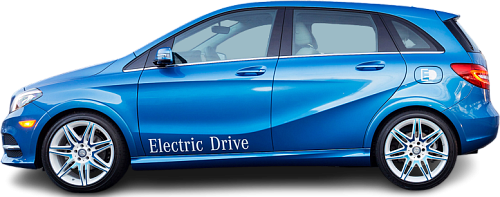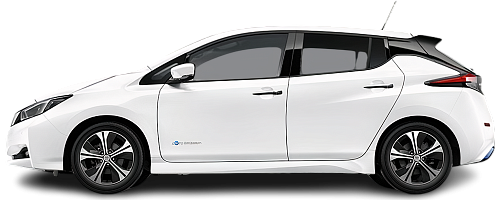USA EV Comparison: Mercedes B-Class 250e vs Nissan Leaf 40 kWh
Struggling to Decide? Let AI Help!
Your AI Summary Is Ready!
General Info
Since both vehicles have been discontinued, they are now only available on the used car market. You can get the Mercedes B 250e (2014-2017) for as low as $9496, while the Nissan Leaf 40 kWh (2017-2022) begins at $8700.
The two vehicles share the same body style: Hatchback.
| Property | Mercedes B-Class 250e | Nissan Leaf 40 kWh |
|---|---|---|
| Years of Production | 2014-2017 | 2017-2022 |
| Current Status | Discontinued | Discontinued |
| Country of Manufacture | Germany, Hungary | Japan, UK, USA |
| Body Style | Hatchback | Hatchback |
| Market Availability | EU, USA | EU, USA |
| Price USA (Used) | $9496 | $8700 |
| GCC Score | 4.6 | 4.8 |
Range and Efficiency
The Nissan Leaf 40 kWh (2017-2022) boasts a greater real-world range, a larger battery, and superior energy efficiency compared to the Mercedes B 250e (2014-2017).
| Property | Mercedes B-Class 250e | Nissan Leaf 40 kWh |
|---|---|---|
| Range (EPA) | 87 mi | 149 mi |
| Range (WLTP) | - Range (WLTP) | 168 mi |
| Range (GCC) | 88 mi | 149 mi |
| Battery Capacity (Nominal) | 31 kWh | 40 kWh |
| Battery Capacity (Usable) | 28 kWh | 39 kWh |
| Efficiency per 100 mi | 31.8 kWh/100 mi | 26.2 kWh/100 mi |
| Efficiency per kWh | 3.14 mi/kWh | 3.82 mi/kWh |
| Range and Efficiency Score | 4 | 5.6 |
Charging
Both vehicles utilize a standard 400-volt architecture.
The Mercedes B 250e (2014-2017) has no DC fast charging capability, whereas the Nissan Leaf 40 kWh (2017-2022) can charge at up to 50 kW.
The Mercedes B 250e (2014-2017) features a more powerful on-board charger, supporting a maximum AC charging power of 10 kW, whereas the Nissan Leaf 40 kWh (2017-2022) is limited to 6.6 kW.
| Property | Mercedes B-Class 250e | Nissan Leaf 40 kWh |
|---|---|---|
| Max Charging Power (AC) | 10 kW | 6.6 kW |
| Max Charging Power (DC) | - Max Charging Power (DC) | 50 kW |
| Architecture | 400 V | 400 V |
| Charge Port | Type 1 (J1772) | CHAdeMO |
| Charging Score | 3.9 | 3.3 |
Performance
Both vehicles are front-wheel drive.
The Mercedes B 250e (2014-2017) boasts greater motor power and accelerates faster from 0 to 60 mph.
| Property | Mercedes B-Class 250e | Nissan Leaf 40 kWh |
|---|---|---|
| Drive Type | FWD | FWD |
| Motor Type | PMSM | PMSM |
| Motor Power (kW) | 132 kW | 110 kW |
| Motor Power (hp) | 177 hp | 148 hp |
| Motor Torque | 251 lb-ft | 236 lb-ft |
| 0-60 mph | 7.5 s | 7.7 s |
| Top Speed | 99 mph | 90 mph |
| Performance Score | 3.5 | 3.1 |
Dimensions
The Nissan Leaf 40 kWh (2017-2022) is longer, but has a similar width and height to the Mercedes B 250e (2014-2017).
Both models have similar wheelbase lengths.
| Property | Mercedes B-Class 250e | Nissan Leaf 40 kWh |
|---|---|---|
| Length | 171.6 in | 176.4 in |
| Width (with Mirrors) | 79.1 in | 79.9 in |
| Width (w/o Mirrors) | 70.3 in | 70.5 in |
| Height | 61.3 in | 61.4 in |
| Wheelbase | 106.3 in | 106.3 in |
Cargo and Towing
The Nissan Leaf 40 kWh (2017-2022) features a larger trunk, but the Mercedes B 250e (2014-2017) offers greater maximum cargo capacity when the rear seats are folded.
Neither car is equipped with a frunk (front trunk).
Neither vehicle is officially rated for towing in the US.
| Property | Mercedes B-Class 250e | Nissan Leaf 40 kWh |
|---|---|---|
| Number of Seats | 5 | 5 |
| Curb Weight | 3924 lb | 3433 lb |
| Cargo Volume (Trunk) | 17.7 ft3 | 23.6 ft3 |
| Cargo Volume (Max) | 51.4 ft3 | 30 ft3 |
| Cargo Volume (Frunk) | - Cargo Volume (Frunk) | - Cargo Volume (Frunk) |
| Towing Capacity | - Towing Capacity | - Towing Capacity |
| Cargo and Towing Score | 4.5 | 4.5 |




